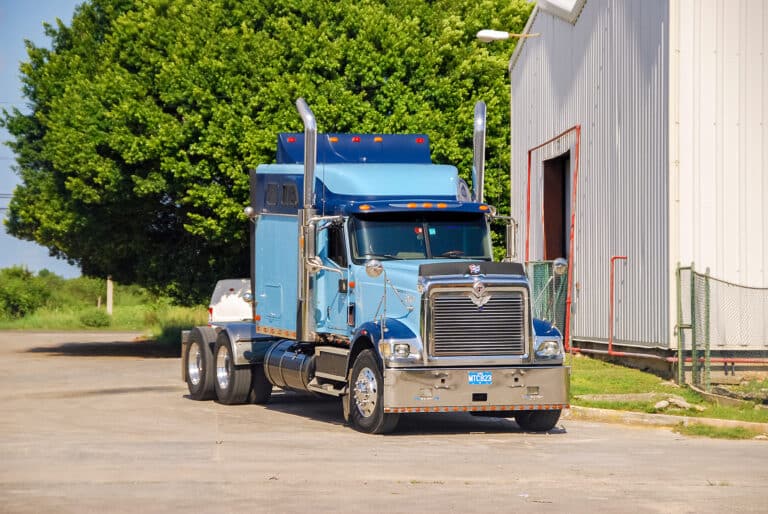For Canadian trucking companies, managing a fleet of vehicles is more challenging than ever. It’s not just about keeping trucks on the road anymore. Today, it’s about using the right mix of vehicles, drivers, technology, and information to get the best results. Effective motor vehicle fleet management can make a big difference in how well a company does.
Fleet managers are facing a perfect storm of challenges these days. They’re dealing with fuel costs that keep going up, eating into their profits. At the same time, safety rules are getting stricter, requiring constant attention to stay compliant. Many carrier companies are struggling to find and keep enough drivers, which makes it hard to keep operations running smoothly. On top of all that, customers are more demanding than ever before – they want to know where their shipments are at all times and expect top-notch service.
To do well in this tough environment, fleet managers need to use a complete approach that makes good use of technology. This article looks at how combining key strategies can turn fleet management from a challenge into a real advantage for trucking companies.
Do you have any questions? Talk to ELD Advisor: 650-405-3372 or Request Callback
The Evolving Landscape of Fleet Management
The world of fleet management is changing fast, and trucking companies who can keep up will have a competitive advantage. Motor vehicle fleet management systems help truckers run their operations in the most efficient, safe, and customer-friendly way possible. It’s not just about knowing where your vehicles are, but also making sure they’re running smoothly, your drivers are doing a good job, and you’re following all the rules.
GPS tracking is now standard, letting companies know where their trucks are at all times. They also provide information that helps fleet managers make smarter decisions about routes, maintenance, and driver training.
The rules of the road are changing too. Electronic logging devices (ELDs) are now required, which has changed how companies track driving hours. Keeping up with these regulations is crucial to avoid fines and keep trucks on the road.
Additionally, customer expectations have shifted. In today’s world, people want to know exactly where their shipments are and when they’ll arrive. This means trucking companies need to provide real-time tracking and quick updates to stay competitive.
All these changes mean fleet managers have to think differently about how they run their operations. It’s not just about getting from point A to point B anymore – it’s about doing it in the most efficient, safe, and customer-friendly way possible. Choosing the right technology partner is crucial in getting the most out of fleet management technology.

Key Components of Effective Fleet Management Systems
To run a successful trucking operation today, fleet managers need to keep several important pieces working together smoothly. Let’s break down these key components:
- Vehicle tracking. GPS systems show where each truck is in real-time, sending back data about how the truck is performing, how it’s being driven, and even predicting potential problems. This information helps managers make quick decisions and plan better.
- Route optimization and planning. Smart software can crunch numbers to find the best paths, considering things like traffic, weather, and delivery windows. This saves time, fuel, and money.
- Maintenance management. Modern systems can predict when a truck might need repairs, based on its performance data. This helps prevent breakdowns on the road and saves money on major repairs.
- Fuel management. With fuel being a big expense, managing it well is key. Systems can track fuel use for tax reporting purposes and spot inefficient driving habits to help managers implement solutions.
- Compliance and regulatory adherence. Modern systems help keep track of all the necessary paperwork, driving hours, and safety regulations. This not only avoids fines but also keeps the fleet running smoothly and legally.
The real power comes when all these components work together. For example, data from vehicle tracking can help with route planning, which affects fuel use and driver schedules. It’s like a well-oiled machine where each part helps the others work better.
Balancing Efficiency, Safety, and Compliance
Running a successful trucking operation is like walking a tightrope. You need to be efficient to make money, but you can’t cut corners on safety or following the rules. Here’s how smart fleet managers strike this balance:
- Improving operational efficiency. To boost efficiency, many companies are using software to plan the best routes. This cuts down on wasted kilometers and helps drivers avoid traffic jams. Some systems also offer idling monitoring, helping them spot wastage and train drivers in fuel-efficient driving techniques.
- Implementing safety protocols. Safety isn’t just about following rules – it’s about creating a culture where safety comes first. Many companies are using in-cab cameras and sensors to coach drivers on safe habits.
- Ensuring regulatory compliance. Staying compliant with regulations like Hours of Service (HOS) and the ELD mandate is crucial. Modern electronic logbooks make it easier to track driving hours accurately. They also help keep drivers within legal limits.
The key takeaway is that efficiency, safety, and compliance aren’t competing goals – they’re interconnected. When you improve one area, it often benefits the others too. Fleet managers must find ways to make all these pieces work together, creating a safer, more efficient, and law-abiding operation.

Leveraging Technology for Improved Fleet Operations
Technology is changing the trucking industry in a big way. Let’s look at some key motor vehicle fleet management software tools that are making fleet operations smoother and more efficient.
ELD Solutions and Their Benefits
Electronic logbooks are now required by Transport Canada, but they’re more than just a rule to follow. These devices automatically track driving hours, which helps prevent driver fatigue and keeps everyone on the right side of the law. Many fleets report that ELDs also cut down on paperwork and help settle disputes about delivery times.
GPS Fleet Tracking
GPS tracking lets fleet managers see where every truck is in real-time. This helps with route planning, dispatch, and accurate delivery estimates. It also allows for quick responses if a truck breaks down. In the event of theft, businesses can quickly locate and recover stolen vehicles or valuable equipment, minimizing losses and downtime.
Predictive Analytics and AI in Fleet Management
By analyzing data from trucks, routes, and even weather patterns, predictive analytics can forecast potential problems before they happen. This might mean scheduling maintenance before a breakdown occurs or adjusting routes to avoid bad weather. AI can also help optimize routes and fuel usage in ways that humans might miss.
Mobile Apps for Drivers and Managers
Smartphones aren’t just for personal use anymore. Many fleets now use mobile apps to keep everyone connected. Drivers can use apps to log hours, report issues, or get turn-by-turn directions in their preferred device. Managers can use apps to track shipments, communicate with drivers, or approve time off requests – all from the palm of their hand.
Integration for a Comprehensive Solution
The real power comes when all these technologies work together. For example, data from ELDs can feed into route optimization software. GPS tracking can trigger mobile alerts to managers. By connecting all these systems, fleet managers get a complete picture of their operations and can make better decisions faster.
Remember, technology is a tool, not a magic solution. It works best when it’s paired with good training and clear processes. But when used right, these tech tools can help fleets run safer, smoother, and more profitably than ever before.
Data-Driven Decision Making in Fleet Management
Every truck in your fleet is like a rolling data factory. It generates information about fuel use, driving habits, engine performance, and more. Collecting and making sense of this data can help fleet managers spot problems early, find ways to save money, and make better decisions overall. It’s like having a super-powered dashboard for your entire operation.
Another important metric is the Key Performance Indicators (KPIs). KPIs are the vital signs of your fleet. Some important ones to watch include:
- Fuel efficiency (kilometers per gallon)
- On-time delivery rate
- Vehicle utilization rate (how much each truck is being used)
- Maintenance costs per kilometers
- Driver safety scores
- Cost per kilometers
By keeping an eye on these numbers, you can quickly see what’s working well and what needs improvement. Efficient data analysis can help in many ways, including productivity, cost reduction and service improvement.
On the other hand, while data is powerful, it can also be overwhelming. Here are some common hurdles and how to clear them:
- Too much data. Focus on collecting only the most relevant information. Quality beats quantity.
- Data silos. Make sure different systems (like GPS tracking and maintenance records) can talk to each other.
- Lack of analysis skills. Invest in training or tools that make data easy to understand and use.
- Privacy concerns. Be clear with drivers about what data is collected and why. Follow all privacy laws and regulations.
Remember, the goal of all this data isn’t just to have numbers – it’s to make better decisions. Whether it’s choosing the best route, scheduling maintenance at the right time, or coaching drivers to be more efficient, data can help fleet managers make choices that keep trucks rolling and profits growing.

Best Practice Guidelines for Prioritizing Driver Management
In our rush to embrace technology, it’s crucial not to overlook the human element of fleet management. Drivers are the lifeblood of any fleet operation, and their performance can make or break your bottom line.
Effective driver management goes beyond basic training and scheduling. It requires adhering to best practice guidelines, including:
Training and Development: Good training isn’t just about teaching the basics. It’s about helping drivers grow in their careers. This might include:
- Regular safety refresher courses
- Training on new technologies in trucks
- Courses on fuel-efficient driving
Performance Monitoring and Feedback: It’s important to keep an eye on how drivers are doing, but in a way that helps them improve, not just criticizes. This could involve:
- Regular check-ins with supervisors
- Using data from trucks to coach on things like fuel efficiency
- Recognizing and rewarding good performance
Incentive Programs and Career Growth: Drivers want to know they have a future with the company. Some ways to show this include:
- Bonuses for safe driving or fuel efficiency
- Clear paths for moving up in the company
- Recognition programs for top performers
By investing in your drivers, you’re not just reducing turnover—you’re building a more skilled, motivated workforce that can drive your fleet’s performance to new heights.

Cost Control and Financial Management
In the trucking business, keeping costs under control is crucial for success. Fleet managers need to handle the financial side of things effectively to stay competitive.
Reducing operational costs is a top priority. This includes regular maintenance to prevent expensive breakdowns, training drivers in fuel-efficient techniques, using route optimization software to cut down on wasted kilometers, and implementing fuel card programs for better diesel prices.
Effective budgeting and forecasting help avoid surprises and keep the business on track. Many companies use specialized fleet management software with budgeting tools tailored for the trucking industry. Creating detailed annual budgets, regularly updating forecasts based on current trends, and using data analytics to predict future costs and revenues are key practices.
Smart asset acquisition and disposal strategies can make a big difference to the bottom line. This involves carefully timing new truck purchases to take advantage of deals or tax benefits, considering leasing versus buying based on the company’s financial situation, and having a plan for selling or trading in older trucks before they become too expensive to maintain.
By staying on top of these financial aspects, fleet managers can keep their operations lean and profitable, even when facing challenges like rising fuel costs or economic downturns.
HOS247’s Motor Vehicle Fleet Management System
HOS247 provides trucking companies with a complete fleet management platform that simplifies operations and enhances performance. Our all-in-one solution combines essential tools like GPS tracking, IFTA calculations, and ELD compliance with features designed to improve efficiency and ensure safety.
- Electronic logging device. Our ELD system is reliable, easy to use and backed by top-rated customer support.
- GPS fleet tracking. Our GPS tracking system provides real time alerts and precise location information even in remote areas.
- IFTA calculations. Automate IFTA tax reporting with our integrated feature, which tracks kilometers across state lines and provides automatic calculations to save time and reduce errors.
- Idle monitoring. Reduce unnecessary fuel consumption with HOS247’s idle monitoring system, which helps you keep track of idle times and identify areas for improvement to lower costs.
- Vehicle maintenance tracking. Stay ahead of repairs with proactive vehicle diagnostics and maintenance alerts, helping you avoid breakdowns and reduce downtime.

Key Benefits of HOS247
HOS247 offers a range of powerful features tailored to meet the needs of modern trucking fleets. From ensuring regulatory compliance to enhancing overall fleet efficiency, our platform delivers tangible benefits that help companies streamline operations and drive success. Here’s what sets HOS247 apart:
- User-friendly platform. Designed with simplicity in mind, our platform offers an intuitive interface for both drivers and managers, ensuring ease of use and smooth operations.
- Reliable hardware. HOS247’s durable devices are built to withstand harsh trucking conditions and come with stable Bluetooth and cellular connectivity to ensure uninterrupted service.
- Flexible subscription plans. Our pricing plans are designed to accommodate fleets of all sizes, with customizable features to meet your specific needs without paying for extras.
- No long-term contracts. Enjoy the freedom of no contract commitments. HOS247 offers flexibility and allows you to scale or cancel your fleet management solution based on your changing requirements.
- Efficient customer support. Our knowledgeable support team is available every day of the week. We offer multilingual assistance and a convenient call-back policy, ensuring you always have the help you need when you need it.
HOS247 provides the tools and support that trucking companies need to manage their fleets efficiently and stay ahead in an ever-changing industry.
Future Trends in Motor Vehicle Fleet Management
The world of fleet management is always changing, and it’s important to keep an eye on what’s coming next. There are several key trends that fleet managers should be watching closely.
Self-driving trucks are no longer just science fiction. While fully autonomous vehicles aren’t here yet, many companies are testing trucks that can drive themselves in certain situations. This could help with driver shortages and improve safety. Alongside this, blockchain technology, which creates secure, unchangeable records, could revolutionize how shipments are tracked and payments are made.
More fleets are going green, not just to help the environment, but also to save money in the long run. This includes switching to electric or hybrid trucks, using alternative fuels like natural gas, and improving aerodynamics to reduce fuel use.

We can expect more rules about emissions and safety in the future. This might include stricter limits on pollution from trucks and new requirements for safety technology.
To be ready for these changes, fleet managers should stay informed about new technologies and regulations, be willing to test new ideas on a small scale, invest in flexible systems that can adapt to change, and train staff to be comfortable with new technologies.
By keeping an eye on these trends and being ready to adapt, fleet managers can turn future challenges into opportunities for growth and improvement.
Conclusion
Running a successful fleet in today’s world means juggling many different pieces. The key is to take a complete approach that brings together all aspects of fleet management and use the data to make smart decisions. The trucking industry will keep changing, but those who embrace new technologies and keep learning will be in the best position to succeed.
Remember, the goal isn’t just to keep up with the competition, but to stay a step ahead. By partnering with a reliable motor vehicle fleet management provider, you can turn your fleet into a powerful asset that drives your business forward.

As an expert in B2B and B2C sales, I’ve dedicated myself to perfecting sales processes and client retention strategies in the logistics and trucking industry. I have significantly contributed to the expansion of the ELD service, catering to retail and wholesale clients in need of HOS247 ELD solutions. My unwavering commitment to implementing state-of-the-art sales techniques and technologies ensures the continuous growth and success of businesses I work with.












ELD logs are here to stay: using an electronic logging device will become mandatory for commercial vehicles in Canada as of January 1, 2023. Professionals in the industry must choose and equip one to comply with the law. This is

A truck daily log book is used to record duty statuses of commercial drivers to ensure compliance with hours of service rules and regulations. There are two types of logbooks: Paper logs. The driver must fill them out manually and

When the ELD mandate took effect, it changed the reality for every professional driver on the road. Electronic logbooks went from optional equipment to required tools that every commercial truck must have. For both independent drivers and fleet managers, selecting